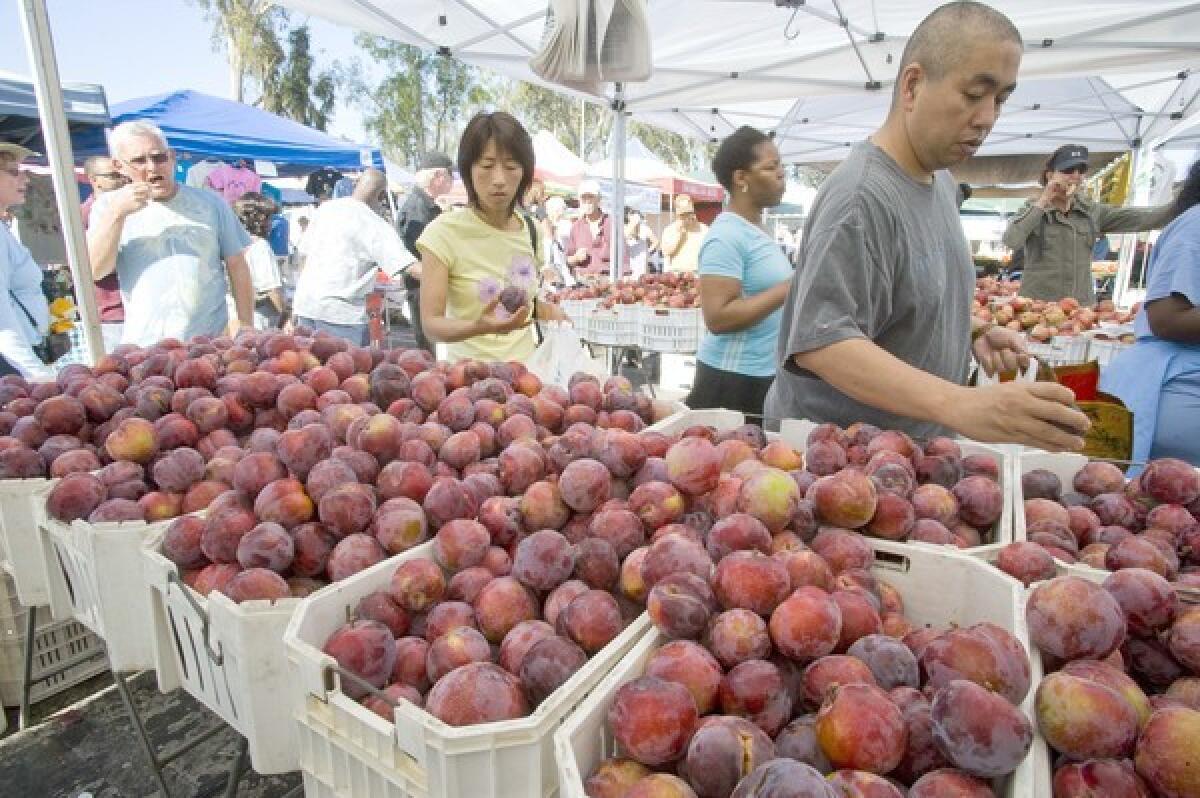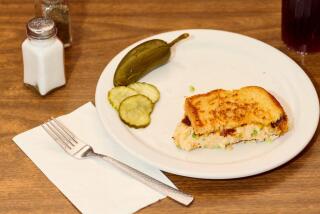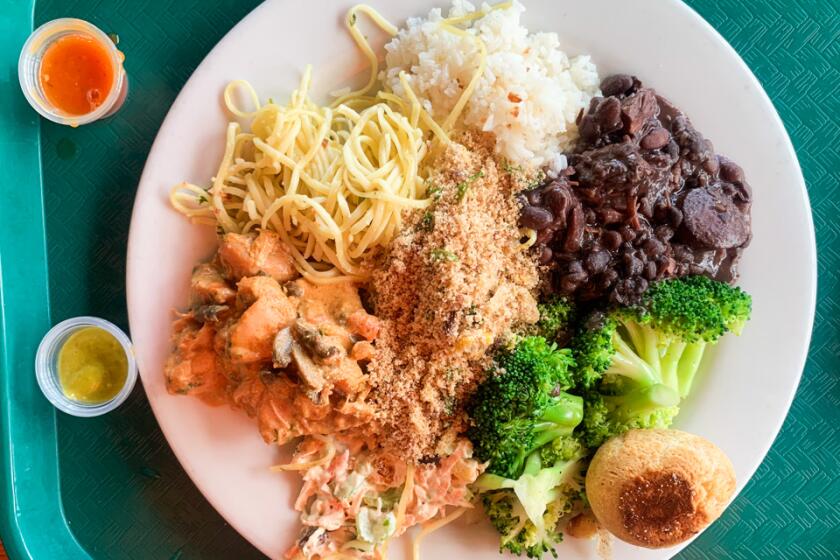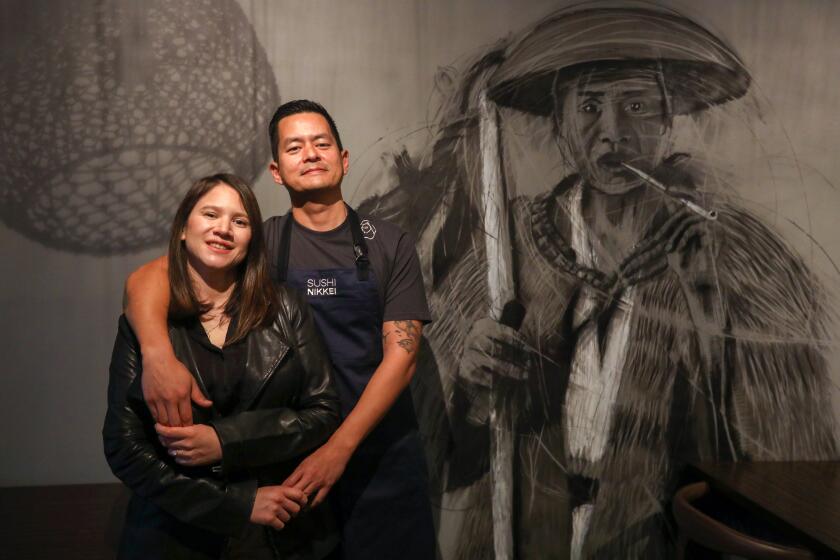Market Watch: Heirloom tomatoes, Pluots, Japanese bell peppers in Torrance

The Torrance farmers market is one of the three largest and best in the Southland, along with Santa Monica and Hollywood, and one of the very few that qualifies as a destination. Bustling and well-run, it always has a lot to offer, but particularly so now, in peak season for so many fruits and vegetables.
The cool spring delayed their harvest by a couple weeks, but Darrell and Maria Elser of Yucaipa are finally bringing their amazing spread of heirloom tomatoes to markets. They’ve got a lot of unusual varieties, far beyond the usual Purple Cherokees and Brandywines, such as Marianna’s Peace, a richly flavored red tomato with a story of origin worthy of Tolstoy; Crnkovic, a pink beefsteak as delicious as it is hard to pronounce; and Amana Orange, from Iowa. Signs next to many varieties not only list their names but recount their stories.
PHOTO GALLERY: David Karp captures what’s fresh this week at the farmers markets.
The Elsers, who sell at Torrance Saturday, Redlands, Big Bear, Palos Verdes and Hollywood, harvest their tomatoes perfectly ripe and spread them out on the table individually, with signs imploring customers to avoid gratuitous groping.
There are now several dozen varieties of Pluots, hybrids of plum and apricot that resemble plums, in commercial production, but the best is still one of the first, Flavor King, patented in 1992. It’s three-eighths apricot, from which it inherited a mellow sweetness; three-eighths Red Beaut plum (an undistinguished early variety, although it seems to have contributed piquancy); and one-quarter Mariposa (an “improved” version of Luther Burbank’s original red-fleshed plum, the Satsuma). Put them all together and you get a fantastically rich-flavored fruit.
It’s mostly fallen out of commercial production because it sometimes has pollination problems, along with a crusty cavity called a “gum pocket,” and tends to crack when ripe. A commercial grower who pulled out his trees because the fruits cracked said, “I didn’t like sharing them with the cows.”
Ken Lee of Reedley is bringing Flavor Kings to Torrance, Palos Verdes, Hollywood and South Pasadena. Scott Farms of Dinuba has them at Santa Monica Wednesday; and Balderama Farms of Orosi sells them at Hollywood, Santa Monica Pico and Santa Monica Wednesday. For best flavor the fruits must be ripe, dark red to purplish, rather than light red.
Kanji Yasutomi of Pico Rivera has Japanese bell peppers, which are much smaller and have thinner skins than the standard item. They are suitable both for grilling and for use in salads, says Yasutomi, who obtained the seeds from a Japanese catalog, and sells them mostly green, along with a few sweet red ones.
Torrance farmers market, Charles H. Wilson Park, 2200 Crenshaw Blvd., between Carson Street and Sepulveda Boulevard, Saturdays 8 a.m. to 1 p.m.
Tips of the week: Deep golden yellow, richly flavored “Gladiator” nectarines from Fitzgerald Kelly of Reedley provide a reminder of what this noble fruit used to taste like before its flavor was diluted when it was adapted to industrial fruit commerce.
Circle C Ranch, famous as one of the first farms to sell Persian mulberries, will offer the inky dark purple, intensely sweet-tart berries at the Hollywood farmers market for the next several Sundays. The vendor and family member, Shaheen Zekavat, works during the week, so she is unable to sell at other markets, but on Saturdays she harvests at the farm in Lake Hughes, in memory of her deceased mother, Kim Blain, who co-owned and dearly loved the orchard.
Circle C may also still have a few Montmorency tart cherries, the bright red, slightly soft fruits ideally suited for making pies and preserves. Tart cherries, which are a different species from sweet cherries, require more winter chill than most California cherry districts provide (they are primarily grown in more northerly states such as Michigan and Utah), and so are rarely found at local farmers markets, although many shoppers and especially chefs ask for them.
The Circle C orchard is at an elevation just high enough to produce a decent crop. Shaheen’s father, Seid, who founded the orchard and now helps with it, planted sour cherries because the fruit is essential in the cooking of his native Iran, where it is used in stews and rice dishes.
More to Read
Eat your way across L.A.
Get our weekly Tasting Notes newsletter for reviews, news and more.
You may occasionally receive promotional content from the Los Angeles Times.






